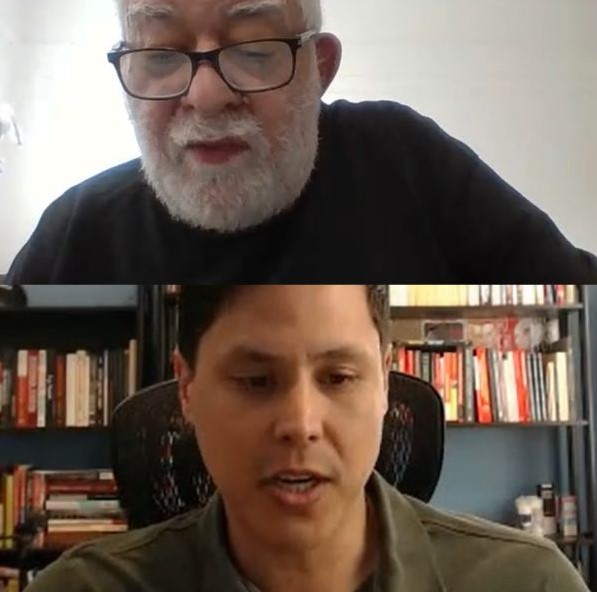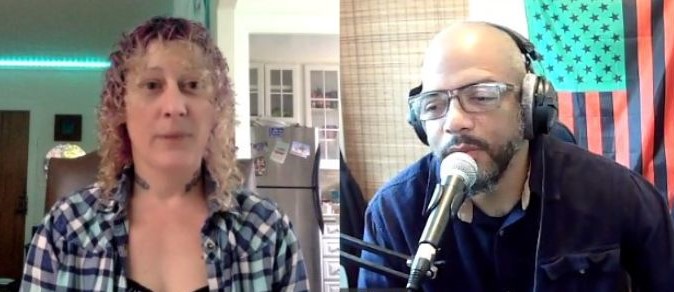
Joe Urgo and Will Griffin
April took We Are Not Your Soldiers to speaking locations both within and outside the borders of the United States – remotely, although we would have loved to have done all these visits in person!
We started with a very new experience – speaking for two hours with graduate diplomacy/security students in France. The entire discussion was in English, a language in which they’re fluent. Presentations were made by Will Griffin and Joe Urgo.
Their questions were thoughtful and deep. Here are a few examples:
Joe, Will, thank you both for your shattering presentations and for your courage in coming to speak to us about your experiences. You both joined the military to serve your nation’s interest but the things you saw made you realize that the aggressiveness of American defense policy and especially the racism, xenophobia and systemic misogyny within its ranks and towards all foreigners served only violence rather than protecting the interest of American citizens. Today, as a veteran and American citizen, do you have renewed confidence in the state? And how do you feel today: angry, desperate, or hopeful that American ethnocentrism and the violence more generally in our societies will gradually disappear?
As someone of Vietnamese descent, your testimonies were really insightful. I noticed that you have not mentioned Agent Orange, the herbicide that was sprayed by the U.S. Air Force on Vietnamese forests. Last year, a French victim made international headlines by suing in a French court several U.S. multinationals that sold the agent to the U.S. government. In the end, they were not held accountable at all. The generational trauma and health issues of the victims were never acknowledged by the U.S. government either. I was wondering if you could comment on that.
Thanks a million for these insightful interventions. Joe, you said no easy questions so I will ask a personal one to both of you. Your anti-war fight seems, to me, like a David and Goliath fight, especially when you look at the growing importance given to the army in most countries. Do you ever doubt the real impact you achieve through your honorable activism? Do you have any experience to share with us? How do you keep up your faith?
One student sent us this message at the end:
Thank you for taking the time to share with us your experiences in the military. For young people studying security it is so very important to attend to presentations showing the other side of the ledger. I think your level of detail and your anecdotes were much appreciated as they concretized your stories. Moreover, I am certain some students, including me, would have liked to talk longer with you in a less Q&A-type of format. Two hours was good enough for the formal presentation but a continuation (at the pub?) would have been most welcomed if the ocean did not separate us.
You can read some more commentaries here on our website.
Our visits continued.

Joy Damiani and Miles Megaciph
We also went to a women’s studies class in a community college on Long Island NY where Joy Damiani presented and then answered questions which focused on issues such as assault, concerning women in the military. Will Griffin spoke to two classes at a New York City community college which had recently viewed the documentary, “Why We Fight.” Will then headed, again virtually, to North Carolina to present to two community college classes there which have been studying the Milgram and Stanford Prison experiments. Miles Megaciph completed the April visits with presentations, sharing his experiences creatively through performances of his music, to four classes at a large NYC public high school.
One of the students wrote Miles, “Thank you for being so expressive, heartfelt and insightful” while another said, “Thank you for sharing your heart-breaking experiences. The teachers noted, “So many students found your words and emotions moving and are eager now to do their own research.”

